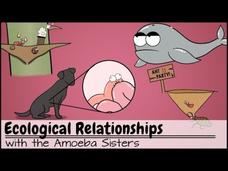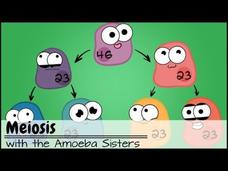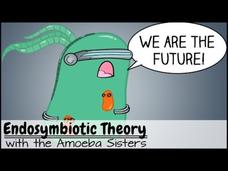PBS
Solar Wind and Storms
Does the very thing that is responsible for life on Earth also have a dark side? Space scientists differentiate between sunspots, solar flares, and CMEs in an enlightening activity. The lesson, one of several in a unit presented by NOVA,...
PBS
The Dynamic Sun
Sunspots, solar flares, coronal mass ejections ... why is the sun so stirred up? Scholars watch animations of the interaction between moving plasma and magnetic fields and discuss the sun's behavior. The activity, part of NOVA's sun...
PBS
The Sun's Energy
How does the sun produce so much energy without blowing up? Viewers discover the delicate balance of inward and outward forces within the sun through a short video. The lesson includes discussion questions and is part of a larger sun...
PBS
The Anatomy of the Sun
Welcome to Sun 101! What better way to gain an understanding of our star than to learn about its anatomy? Physical science scholars peer inside to discover the inner workings of the sun through a video and discussion questions. The...
PBS
DNA Spells Evolution
In humans, the rate of mutation from one generation to the next is between 100 and 200 mutations. Discover the role of DNA mutation in evolution with an enriching lab activity.
PBS
Fossils: Rocking the Earth
Scientists learn about animals and plants living today by understanding the fossil record. A helpful resource includes a brief explanation of the process to help scholars complete the online game. It also mentions the gaps in knowledge...
PBS
Training Trees
Each branch of a phylogenetic represents a species, and you can trace each one back through history. A short video, the fourth of seven, introduces phylogenetic trees and the online game lab used in the unit.
TED-Ed
A Simple Way to Tell Insects Apart
Did you know an insect has unique mouthparts based on what and how it eats? This is a simple way to identify the order an insect belongs to. Watch a video that explains the interesting world of insect mouthparts.
SciShow
3 of the Strangest Moons in the Solar System
Explore characteristics of three moons that have traits all their own! An episode of a solar system video playlist explores three moons of the solar system: Miranda, Iapetus, and Hyperion. These moons of Uranus and Saturn vary in their...
SciShow
The Future of Interstellar Communication
Communication through the solar system is a challenging task. Sending probes to different locations in our solar system helps scientists learn about these bodies. As these probes are sent farther and farther from Earth, receiving their...
Amoeba Sisters
Inside the Cell Membrane
Without the cell membrane, our cells just couldn't keep it together! What else does this multifunctional membrane do? Take a deeper look at the fluid mosaic model using a video from an expansive biology playlist. Topics include embedded...
Amoeba Sisters
Alleles and Genes
How do organisms end up with such a wide variety of traits? It's in their genes! Kick off your inherited traits lesson using a brief video that covers alleles and genes. The narrator describes heterozygous and homozygous genotypes, how...
Amoeba Sisters
Protein Synthesis
Can your class visualize how proteins synthesize? Take a tour of the all-important process of protein synthesis to discover why our bodies depend on it. A video from an animated biology playlist covers transcription and translation, as...
Amoeba Sisters
DNA, Chromosomes, Genes, and Traits: An Intro to Heredity
Chromosomes, genes, traits ... how are they all related? A short video introduces the many factors involved in heredity. Junior geneticists explore the transfer of chromosomes from parents to offspring, the proteins created by base pair...
Amoeba Sisters
Ecological Relationships
What are ecological relationships? Well, it can be complicated! Paint a clear picture for pupils with a fun and informative video. It explains and illustrates each relationship thoroughly, from pesky parasites to snuggly symbiotes.
Amoeba Sisters
Characteristics of Life
What makes a living thing, well, living? Explore the many characteristics of living things through an animated video. Science scholars become acquainted with the obvious and not-so-obvious traits exhibited by organisms, then learn that...
Amoeba Sisters
Gel Electrophoresis
Ever wonder how scientists determine how animals are related, or who is guilty of a crime? Discover gel electrophoresis in an easy-to-understand video from a fun biology playlist. Topics include how restriction enzymes create segments of...
Amoeba Sisters
Homeostasis and Negative/Positive Feedback
We all need a little feedback, both positive and negative! Take on one of the trickier Biology 1 concepts using a thoughtfully worded video from a fantastic biology playlist. The narrator explains both types of feedback with plenty of...
Amoeba Sisters
General Lab Safety
From horseplay to hair length, here's a video that covers all your lab safety needs! Animated characters present a fun yet functional resource geared toward all science disciplines. Topics include safety equipment, proper lab etiquette,...
Amoeba Sisters
Asexual and Sexual Reproduction
Why do some organisms reproduce sexually, others reproduce asexually, and some both? Biology scholars examine the pros and cons of sexual and asexual reproduction through a short, informative video. The resource offers great examples of...
Amoeba Sisters
Meiosis
Why do siblings often look so different from one another? Discover the process of making gametes using a short video from a large biology playlist. The narrator explains each step while animated chromatids play out the scenario that...
Amoeba Sisters
Genetic Drift
Survival is a game of chance, catch my drift? Examine the factors that influence genetic drift with an entertaining video from a large biology playlist. The resource covers the myriad conditions that come into play when a species...
Amoeba Sisters
Endosymbiotic Theory
Eukaryotes—were we born from an act of predation that backfired? Ponder this and other questions of evolution with a video from a well-written biology playlist. Topics include the origins of mitochondria and chloroplasts, unusual...
Amoeba Sisters
Speciation
Why can't mules have babies? Answer this—and other burning animal kingdom mysteries—with a short, sweet speciation video! Zoology scholars examine the ins and out of evolution, the role geography plays in inheritable traits, and, most of...























